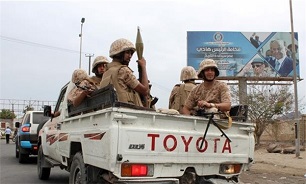UAE-Backed Separatists Send Reinforcements to Aden Amid Clashes
 Reports on Monday said the so-called Southern Transitional Council had sent a large number of armed members from Dhale and Shabwah Provinces, respectively in Southwestern and South-central Yemen, to Aden, Shafaqna reported.
Reports on Monday said the so-called Southern Transitional Council had sent a large number of armed members from Dhale and Shabwah Provinces, respectively in Southwestern and South-central Yemen, to Aden, Shafaqna reported.
The fresh outburst began on Sunday after the separatists managed to take control of a number of sites and military camps run by the former Yemeni administration following intense clashes with Saudi mercenaries.
At least 15 people, including civilians, were killed and over 130 more injured in Sunday's violence.
The International Committee of the Red Cross reported overnight clashes in Aden.
“All night shooting in Aden #Yemen, including heavy weapons,” Alexandre Faite, the head of the ICRC delegation in Yemen based in the capital, Sana’a, said on Twitter, adding that “Those in Southern part of city, including (ICRC staff) still unable to get out.”
The UAE has played a key role in the Saudi military campaign, which was launched in March 2015 with the aim of reinstalling the government of former president Abd Rabbuh Mansur Hadi and crushing the Ansarullah movement that currently runs Yemen’s state affairs.
Prior to the offensive, Hadi had resigned and fled to Riyadh. The Saudi regime and its allies later managed to seize Aden from Ansarullah forces and put it under the control of the ex-president’s officials.
Numerous Arab-language outlets have verified the collision between Saudi and Emirati interests there. Neither Abu Dhabi nor Riyadh has, however, attested to any division within the Saudi-led coalition.
The latest wave of violence broke out a week after Aidarous al-Zubaidi, the leader of the separatist council, said in a statement that the self-proclaimed Yemeni parliament would be barred from convening in the city of Aden unless Hadi removes his “prime minister” and his entire “cabinet.”
The statement declared “a state of emergency in Aden” and said “it has begun the process of overthrowing” Hadi’s “government.”
The separatists have long demanded independence for Yemen’s South, which used to be independent -- with former British colony Aden as its capital -- from its formation in 1967 until 1990, when it was unified with the North.
Last year, it was revealed that the UAE clandestinely supports the secessionists against the Saudi-armed forces loyal to Hadi.
Given its economic importance, Aden’s control would lend considerable leverage to any side exercising ultimate control over the port.
